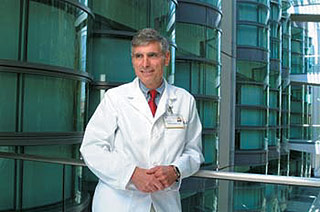Letter from the Dean
Photo: Stephen Gladfelter |
|
 |
|
Dear Readers,
As a pediatric cancer specialist, one of my most painful experiences has been telling parents that there may be no treatment for their child's illness. At the same time, I have had the opportunity during my career to observe how research findings and technologies can offer hope to patients with life-threatening disease. That is what makes so upsetting the current restraints that exist on stem cell research.
Indeed, we have at our fingertips a resource -- stem cell research -- that offers great promise for understanding and treating a number of serious disorders and that could change the course of discussions between physicians, patients and families. Its potential to cure even one disease, diabetes for example, would transform the future for thousands of children.
Last year we launched the Stanford Institute for Cancer/Stem Cell Biology under the leadership of Irv Weissman, MD, one of the world's pre-eminent scientists in the field. Our goal is to bring together basic scientists, clinical scientists and other members of the Stanford community to address the challenges of this new frontier in science and medicine.
But today stem cell research remains embattled in the United States. We are once again watching science pitted against political ideology. As a physician as well as a citizen, I am deeply troubled by what is occurring. It's as if we have entered a time warp and are spectators at the Inquisition's reading of charges against Galileo for his views of the solar system.
Yet, I am an optimist. I believe in the common sense of the American people and am convinced that science will triumph over ideology. But precious time is being lost in the interim.
Moreover, despite the political debate that swirls about, Stanford scientists push ahead, exploring the potential held by embryonic stem cells, as well as stem cells from mature humans -- adult stem cells. Using adult stem cells, we are learning to repair brain damage after a stroke. We are also exploring how to heal neurodegenerative disorders such as Parkinson's and Alzheimer's disease. Using embryonic stem cells, we are working toward repairing the pancreas in diabetes, treating brain diseases and replacing heart muscle after a heart attack.
As dean, I am committed to advancing stem cell research not only at Stanford but also in California and the nation. In November, California voters will have the opportunity to exert extraordinary leadership by approving a state ballot measure, Proposition 71, that will dedicate $3 billion for stem cell research.
As a citizen, I am planning to vote for the measure and I urge each of you to take a close look at it as well. It has the ability to truly transform the state into a global leader in the field. An article about the man behind the initiative appears in this issue.
There will be challenges ahead as stem cell research unleashes its full promise and potential. Yet the path from laboratory to bedside has already been advanced. I believe stem cell biology will be transformational in this decade.
I hope that you will enjoy this special issue of Stanford Medicine, which highlights our research with stem cells and examines the ethical dilemmas we must consider on this new frontier.
You'll also read a personal perspective by actor Michael J. Fox,
who battles Parkinson's disease. It's a poignant reminder
that this work we do is about eliminating suffering and enhancing people's
lives.
With best regards,
Philip A. Pizzo, MD
Professor of Pediatrics and of Microbiology and Immunology
Carl and Elizabeth Naumann Professor
Dean, Stanford University School of Medicine

